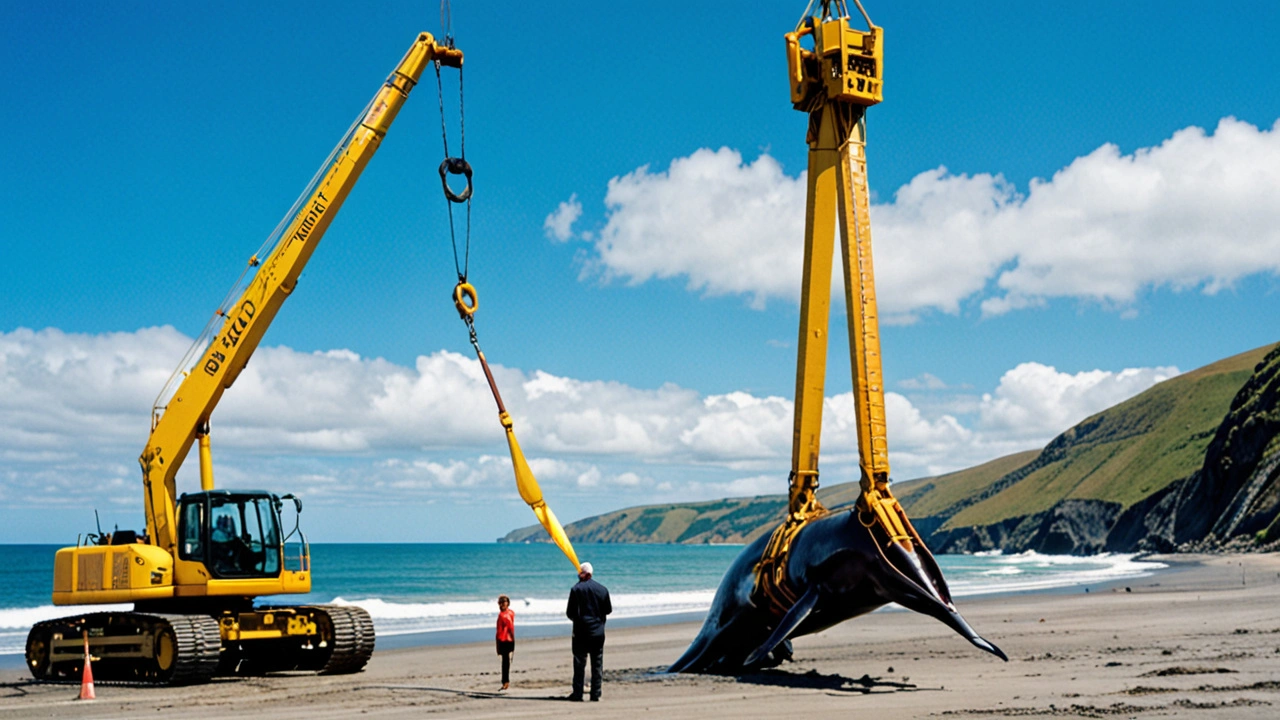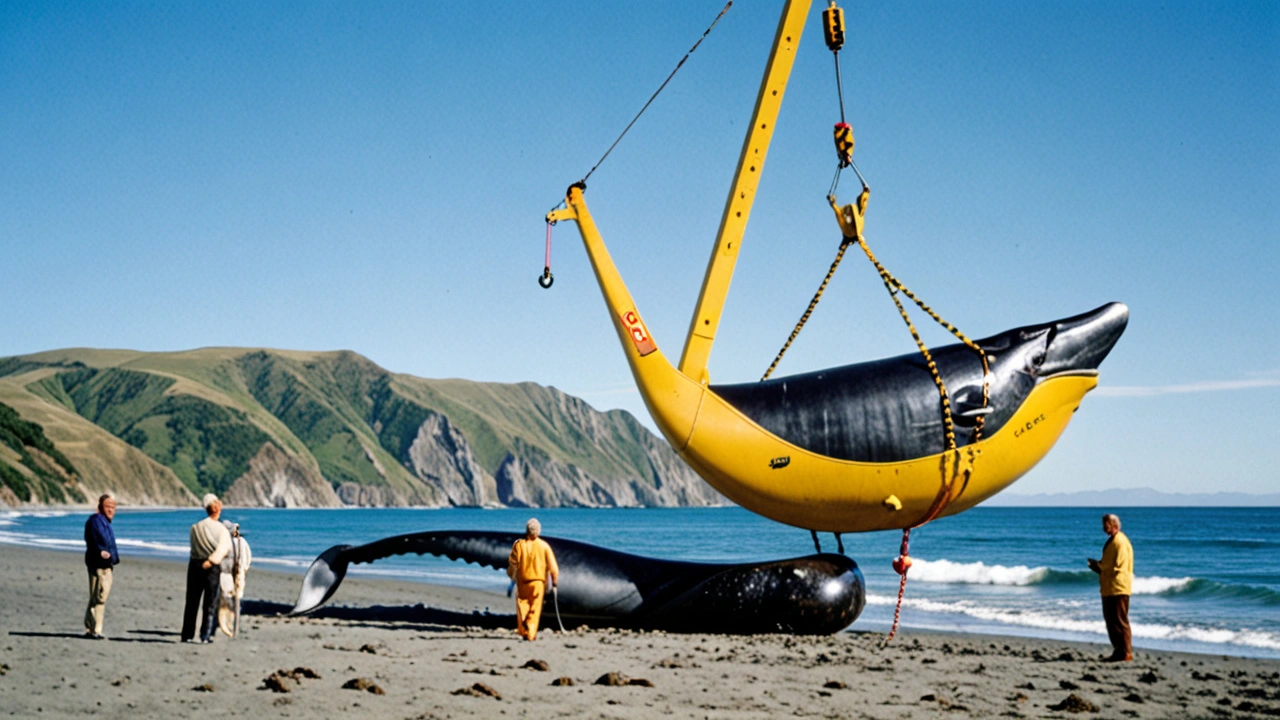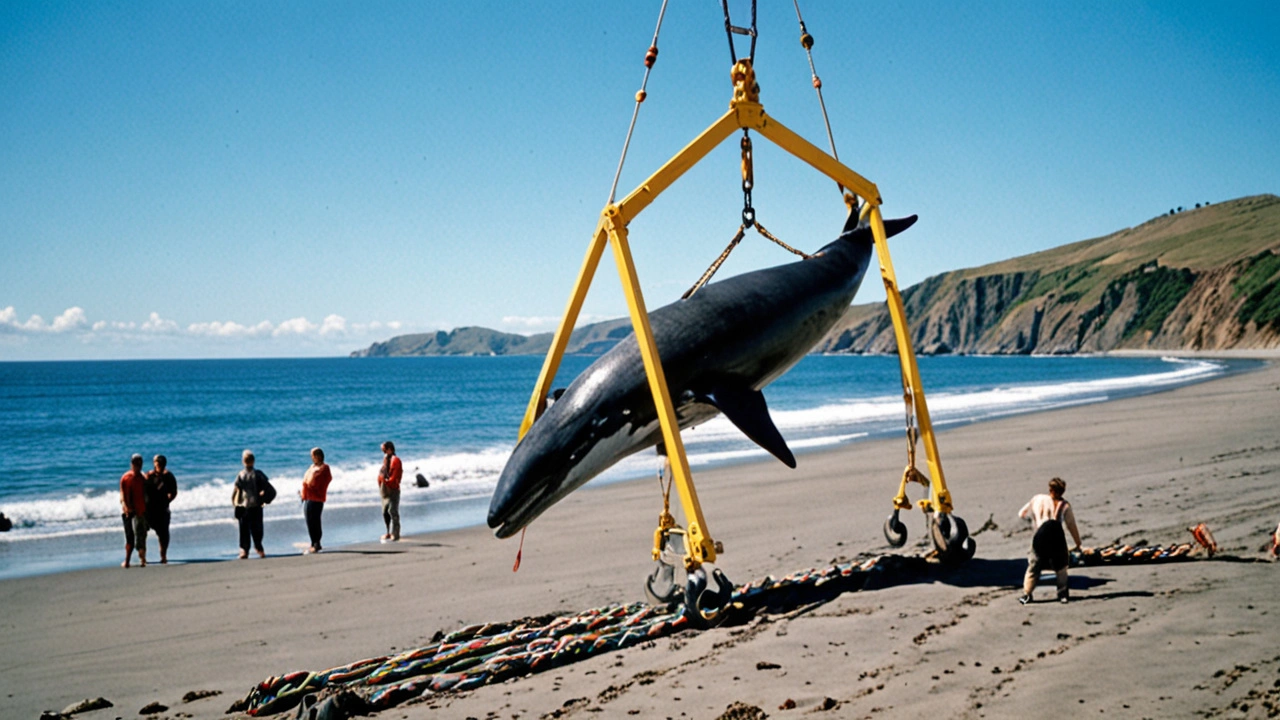Rare Spade-Toothed Whale Discovery on New Zealand's South Island
The coastline of New Zealand's South Island has become a focal point for international scientific interest following the discovery of a rare spade-toothed whale. This elusive marine mammal, measuring an impressive 16 feet in length, washed ashore recently, offering a unique, perhaps once-in-a-lifetime, opportunity for researchers and conservationists alike.
The spade-toothed whale, a species that has eluded extensive study since the 1800s, has only been documented a handful of times. Its rare appearance raises countless questions about its habitat, behavior, and overall existence in the vast expanse of the world's oceans. Some experts believe it could unlock new understanding about marine ecosystems and the diversity of life within them.
Scientific Examination and Identification
The New Zealand Department of Conservation (DOC) has taken the lead in examining the whale. Hannah Hendriks, a technical advisor with the DOC, expressed her excitement over the unprecedented opportunity to study this mammal. She emphasized the need to confirm the whale's identity through genetic testing, a process already underway with samples being meticulously processed.
This effort not only aims to solidify the species identification but also to compile data that could inform about the conservation status of the spade-toothed whale. Understanding potential threats to the species is crucial for developing effective conservation strategies.
Collaborations with Māori Communities
Respecting cultural significance is paramount to the DOC's approach. They are collaborating closely with local Māori communities, recognizing the whale as a taoka, or treasure. Gabe Davies, Coastal Otago Operations Manager, underscored this partnership as essential for managing and respecting the whale carcass.
Such inclusivity ensures that the scientific study of the whale does not overlook its cultural impact, blending respect with research. This practice of involving Indigenous communities provides a holistic approach to such discoveries, merging traditional knowledge with scientific inquiry.

Potential Insights from Dissection
One of the crucial steps in the scientific examination will be the dissection of the whale. Researchers aim to gather data on several fronts. Firstly, they hope to unveil details about the whale's diet, which will shed light on the feeding habits and trophic level of the species within the marine food web.
Additionally, health assessments will be conducted to understand the overall physical condition of the whale at the time of its death. This can indicate the presence of illnesses or environmental stressors that the whale might have encountered.
Understanding the Cause of Death
Of particular interest is determining the cause of the whale's death. Whether it succumbed to natural causes, disease, or human-related factors like pollution or ship strikes, identifying the cause is vital for comprehensive marine conservation efforts.
The dissection process, meticulously carried out by marine biologists and veterinarians, will be a meticulous examination of the whale’s anatomy and physiology, aiming to provide crucial insights.
The Significance for Conservation Efforts
This discovery holds significant promise for future conservation efforts. The data garnered from this incident can inform conservationists about the population dynamics of spade-toothed whales, potentially identifying their usual habitats and migratory patterns. Such information is invaluable for drafting strategies aimed at protecting these mysterious marine giants.
Furthermore, the collaboration between scientists and Māori communities sets a precedent for future conservation work, showcasing the potential for combining modern scientific techniques with traditional ecological knowledge for the betterment of environmental stewardship.

Global Scientific Community's Response
The discovery has not just piqued the interest of local researchers but has resonated with the global scientific community. Marine biologists, oceanographers, and conservationists worldwide are closely monitoring the findings that stem from this event. The spade-toothed whale’s elusive nature makes every bit of information gathered invaluable, contributing to a broader understanding of marine biodiversity.
This unity among scientists highlights the interconnected nature of ecological research, where discoveries in one part of the world can have far-reaching implications, contributing to global conservation dialogues.
The Road Ahead
As the DOC continues its work, the anticipation around future revelations grows. The public and scientific community alike await comprehensive reports and studies derived from the genetic tests and physical examinations of the whale. The hope is that this singular event can cascade into broader awareness and stronger conservation measures not just for spade-toothed whales but for other lesser-known marine species.
In conclusion, the rare appearance of this spade-toothed whale on New Zealand's coast is a powerful reminder of the ocean's profound mysteries. It underscores the continuous need for dedicated scientific research and the importance of cultural respect in handling such natural treasures. As the studies proceed, they promise to enrich our understanding of marine life and sharpen our focus on preserving the delicate balance of our ocean ecosystems.







Nasrin Saning
July 16, 2024 AT 18:33It’s wonderful to see scientists and Māori guardians working side by side to learn from the spade‑toothed whale while respecting its cultural importance
gaganpreet singh
July 23, 2024 AT 17:20The appearance of this rare cetacean presents a moral imperative for the global scientific community; we must not merely seize the opportunity for data collection without reflecting on the ethical dimensions of such an intrusion. The spade‑tooth whale, long considered a ghost of marine lore, now lies inert on the shore, a silent witness to humanity’s relentless encroachment upon the oceans. It is our duty to treat its carcass with reverence, for to do otherwise would betray the very curiosity that drove its discovery. Moreover, the collaborative involvement of Māori communities underscores a necessary shift from colonial extraction toward partnership and mutual respect. Any study that disregards this cultural context would be an act of intellectual vandalism. We should also consider the broader ecological messages this specimen may convey about marine health, pollution, and climate pressures. The genetic analyses being performed must be shared transparently with both local iwi and the international research network, fostering a spirit of openness rather than secrecy. It is incumbent upon funding bodies to allocate resources not only for laboratory work but also for community engagement and education. The dissection, while scientifically valuable, must be conducted with protocols that minimize indignity to the animal’s remains. Scholars must resist the temptation to sensationalize findings for media hype; instead, they should prioritize rigorous, peer‑reviewed publication. The potential insights into dietary habits could illuminate cascading effects within the marine food web, yet this knowledge should serve conservation, not commercial exploitation. The cause of death, whether natural or anthropogenic, holds profound implications for policy reform, especially regarding ship traffic and waste management. An honest assessment may reveal uncomfortable truths about human impact that demand systemic change. Let us not forget that every strand of DNA we decode is a testament to an organism’s evolutionary journey, deserving of our deepest respect. In sum, the scientific intrigue must be balanced with an unwavering ethical compass, ensuring that curiosity does not eclipse compassion.
Urmil Pathak
July 30, 2024 AT 16:33The whale’s size suggests it was an adult, which means the population may include mature individuals we have never seen before.
Neha Godambe
August 6, 2024 AT 15:13While it is commendable that researchers are eager to dissect the specimen, the urgency must not override the respect owed to the animal and the Māori worldview that treats such finds as taonga; I expect all teams to follow the agreed protocols without exception.
rupesh kantaria
August 13, 2024 AT 13:53Upon contemplation of the spade‑toothed whale’s enigmatic existence, one cannot help but ponder the vastness of the oceanic abysses that elude our scholarly grasp; albeit my musings may contain errrors, the profundity of such a creature beckons philosophic discurse that transcends mere taxonomic classification.
Nathan Tuon
August 20, 2024 AT 12:33Let us channel the awe of this discovery into actionable steps that support both scientific inquiry and cultural preservation, remembering that every effort counts towards a sustainable future.
shivam Agarwal
August 27, 2024 AT 11:13The cooperation between the DOC and local iwi highlights a model for future marine research, and it reminds us that knowledge is most powerful when shared across traditions.
MD Imran Ansari
September 3, 2024 AT 09:53Fantastic news! 🌊🔬 The genetic data will likely paint a vivid picture of this elusive species, and I’m excited for the colorful insights that will emerge! 🐋✨
walaal sanjay
September 10, 2024 AT 08:33Honestly, this whole “discovery” is just another excuse for Western scientists to parade around, claim credit, and ignore the fact that the ocean belongs to the people who have protected it for centuries!!!
Umesh Nair
September 17, 2024 AT 07:13i dunno why everyone is hypeing it, maybe it’s just another dead fish, but hey, if it makes headlines, why not?
kishore varma
September 24, 2024 AT 05:53Cool stuff! 😎 Seeing a spade‑toothed whale on the beach is a reminder how wild our planet still is. 🌍🐋
Kashish Narula
October 1, 2024 AT 04:33Indeed, this event underscores the importance of inclusive research practices; let’s keep the conversation respectful and constructive.
smaily PAtel
October 8, 2024 AT 03:13First, the whale’s discovery is a watershed moment for marine biology; second, the integration of indigenous knowledge is non‑negotiable; third, the genetic analysis will set a new benchmark for cetacean studies; fourth, stakeholders must allocate sufficient funding; fifth, dissemination of results should be open‑access; sixth, ongoing monitoring is essential; seventh, public outreach cannot be an afterthought; eighth, policy implications must be evaluated; ninth, collaboration models should be documented; tenth, this case study will inform future protocols; eleventh, education curricula need updating; twelfth, international cooperation will amplify impact; thirteenth, ethical standards must be upheld; fourteenth, cultural reverence should guide all actions; fifteenth, let us celebrate this convergence of science and tradition.
Hemanth NM
October 15, 2024 AT 01:53Great find, concise data will help.
rin amr
October 22, 2024 AT 00:33One must admire the intellectual rigor displayed by the research consortium, yet I contend that without a profound appreciation for the underlying philosophical implications, their work remains superficial at best.
Jai Bhole
October 28, 2024 AT 22:13Yo, while they talk about science, they forget the real truth – nature bows to the will of the motherland, and any study that doesn’t honor that is just empty talk, bro.